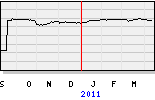
Dutch biopharma company Crucell N.V. (Euronext, Nasdaq: CRXL; Swiss Exchange: CRX) today announced that it received a National Institutes of Allergy and Infectious Diseases (NIAID)/National Institutes of Health (NIH) contract aimed at advancing the development of a multivalent filovirus vaccine that includes both Ebola and Marburg viruses. The contract provides funding of up to $30 million, with additional options that may be triggered at the discretion of the NIH worth a further $40 million.
"We are grateful to the NIAID/NIH for this award, which makes use of Crucell's proprietary AdVac® technology" said Dr. Jaap Goudsmit, Crucell's Chief Scientific Officer. "This award recognizes the scientific basis for using rare adenovirus serotypes to develop vaccines." Dr. Goudsmit added, "The contract builds upon earlier work Crucell has performed with the Vaccine Research Center at NIH, and brings us a step closer to being able to provide effective countermeasures against a highly lethal infectious disease."
Crucell will be the primary contractor with additional services being supplied by the Southwest Foundation for Biomedical Research, located in San Antonio, Texas and Quintiles Guys Drug Research Unit, located in London.
About Ebola and Marburg
The Ebola and Marburg viruses are capable of causing hemorrhagic fever, a severe, often-fatal disease in humans characterized by high fever and massive internal bleeding causing death in 50% to 80% of all cases. Ebola and Marburg outbreaks occur regularly in tropical Africa, affecting both human and great ape populations. Since the Ebola virus was first recognized, approximately 2,200 cases including over 1,500 deaths have been reported. To date over 440 cases of Marburg have been reported with approximately 360 fatalities. Ebola and Marburg usually appear in sporadic outbreaks, and spread within a health-care setting. Because of the high disease-related mortality rates and lack of any vaccine or therapy, the Ebola and Marburg viruses are on the US Centers for Disease Control and Prevention Category "A" list of bioterror agents, together with smallpox and anthrax.
About AdVac® technology
AdVac® technology is a vaccine technology developed by Crucell and is considered to play an important role in the fight against emerging and re-emerging infectious diseases, and in biodefense. The technology supports the practice of inserting genetic material from the disease-causing virus or parasite into a 'vehicle' called a vector, which then delivers the immunogenic material directly to the immune system. Most vectors are based on an adenovirus, such as the virus that causes the common cold. The AdVac® technology is specifically designed to manage the problem of pre-existing immunity in humans against the most commonly used recombinant vaccine vector, adenovirus serotype 5 (Ad5), without compromising large-scale production capabilities or the immunogenic properties of Ad5. AdVac® technology is based on adenoviruses that do not regularly occur in the human population, such as Ad35. In contrast to for instance Ad35 antibodies, antibodies to Ad5 are widespread among people of all ages and are known to lower the immune response to Ad5-based vaccines, thereby impairing the efficacy of these vaccines. All vaccine candidates based on AdVac® are produced using Crucell's PER.C6® production technology.
